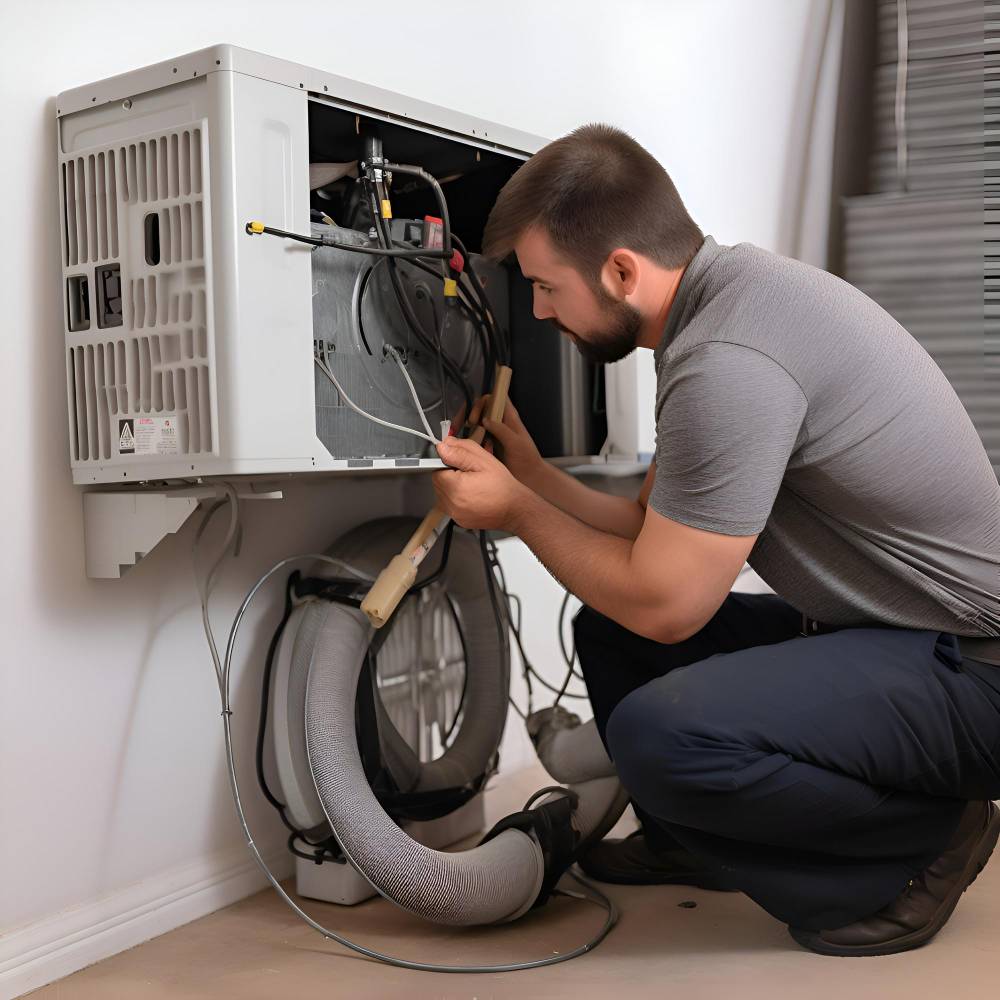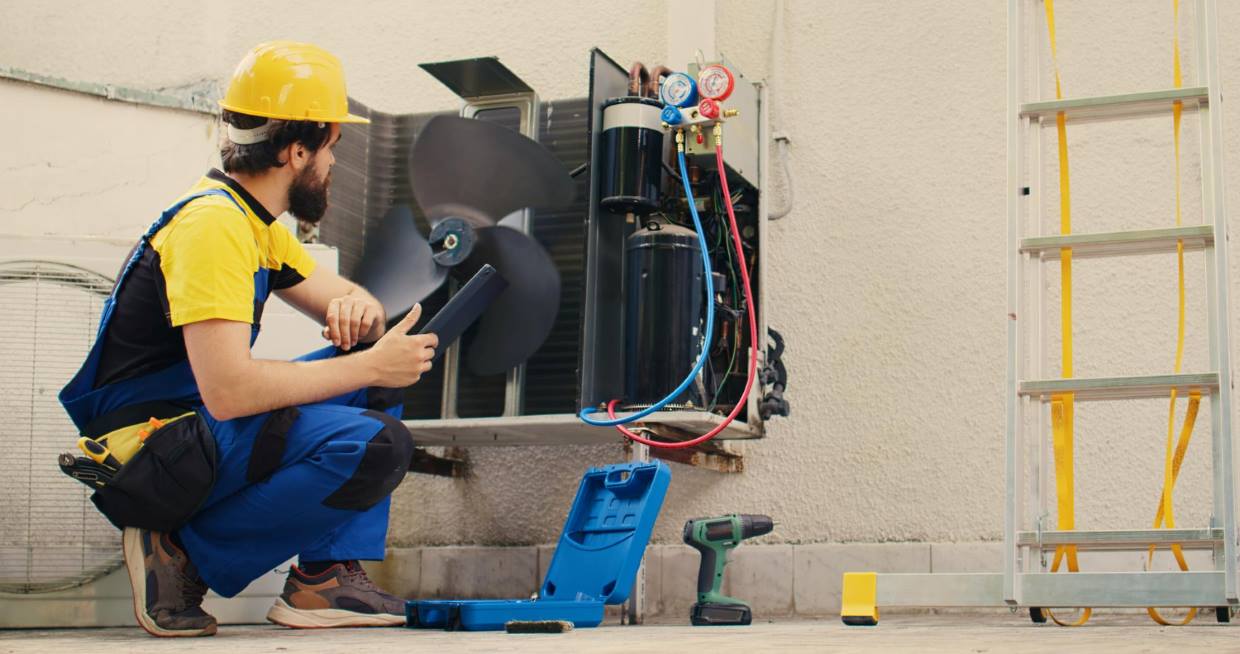How is your air conditioner performing? Is it acting slowly or not turning on at all? It might be a capacitor issue! So, it is time for air conditioner capacitor replacement. This small but mighty component jumpstarts your AC unit’s heart, the compressor. No worries, we will fix the air conditioner capacitor in simple steps.
You will find all the steps to replacing an AC capacitor in this guide. It does not matter what your AC unit needs, we can help you fix it and keep your house cool.
Now that you have your tools, let’s channel your inner handyman and give that AC new life!
Safety First When Replacing Your AC Capacitor
Before air conditioner capacitor replacement, you need to take proper precautions. To ensure your safety, follow these steps before beginning:
- Turn off the power completely. Shut off the breaker that controls your AC unit and remove it from the breaker box.
- Wear protective gear. This includes safety glasses and electrician’s gloves.
- Identify a faulty capacitor for AC unit. Look for bulging or loose terminals.
- Make sure the capacitor is not touching it. This is crucial to avoid electrical shock. You can use a screwdriver or jumper cables with a resistor for discharge.
- After that, remove the wires and test the capacitor with a multimeter.
Remember, safety is always the top priority. If you’re not comfortable replacing AC capacitors yourself, call a qualified technician.
Match the Perfect Replacement Capacitor for Your AC Unit
Replacing a broken capacitor requires finding a replacement one that exactly matches the old one’s specifications. Here’s what to look for on your old capacitor label to ensure compatibility:
- Capacitance (µF): This indicates how much energy the capacitor can store. Get another one with the same microfarad rating.
- Voltage (Volts): Most capacitors are 370V or 440V. A higher voltage is okay but never go lower than your system’s voltage.
- Frequency (Hz): Look for a 50Hz or 60Hz rating to match your old capacitor.
- Terminal Types: The number of metal tabs on the capacitor should match the old one to ensure proper reconnection.
- Case Shape: Round or oval shape doesn’t matter as long as other specs match.
Please Note: If your capacitor has more than three terminals, follow the manufacturer’s instructions carefully for proper wiring during installation.
Pro Tip: In hot and humid climates, expect to replace your AC capacitor more frequently, around 15 years compared to 20 years.
Air conditioner capacitor replacement Steps
Replacing an AC capacitor can be dangerous if not done properly. If you are not comfortable working with electrical wiring, call a qualified technician.
Signs of a faulty capacitor
A faulty capacitor may cause the compressor unit outside your home to not start up.
Safety precautions
- Turn off the AC unit power at the breaker box before beginning.
- Wear gloves and eye protection when working on a capacitor.
- Make sure the capacitor is working before handling it.
Steps to replace the capacitor
- Locate the AC unit’s disconnect switch or breaker box and turn off the power to the unit.
- Remove the access panel to the AC unit’s electrical compartment.
- Find a capacitor. It will be a cylindrical or oval-shaped object with two or four terminals.
- Take a picture of the capacitor and the wires connected to it. This will help you reconnect the wires correctly when installing a replacement capacitor.
- Discharge the capacitor using a screwdriver with an insulated handle. Touch the screwdriver metal blade to the capacitor metal terminal. There may be a spark as the capacitor discharges.
- Note the color of the wires connected to the capacitor and disconnect them one at a time. Use pliers to remove the wire nuts from the capacitor terminals.
- Purchase an updated capacitor that is the same size and has the same capacitance rating as the old capacitor. The capacitance rating is measured in microfarads (µF) and is usually printed on the side of the capacitor.
- Install the upgraded capacitor by connecting the wires to the corresponding terminals. Make sure to match the wire colors to the terminals. To secure the connections, use wire nuts.
- Replace the access panel to the AC unit’s electrical compartment.
- Turn on the AC unit power at the breaker box.
- Please test the AC unit to ensure its correct functioning.
Additional tips
- If you are not comfortable discharging the capacitor yourself, you can call a qualified technician to do it for you.
- When handling the capacitor, be careful not to touch the metal terminals with your bare hands.
- Make sure that the updated capacitor is rated for the same voltage and frequency as the old capacitor.
I hope this information helps you replace the air conditioner capacitor.
Read Also: Indoor Fireplace Heater With Blower: Blower Pros, Cons & Expert Tips
How much does it cost to replace an AC capacitor?
Air conditioner capacitor replacement costs around $180 on average, but it can range from $80 to $400. Most of the cost comes from labor. An HVAC technician will charge you for their time to diagnose the problem, replace the part, and ensure everything works properly. The capacitor itself is inexpensive, typically costing between $8 and $45.
Signs of a faulty capacitor

My AC has been acting strange lately, and after some googling, I found out it could be a faulty capacitor.
Let me tell you, it can be tricky to pinpoint because the system might seem a bit off at first. But there are some warning signs to watch out for:
The air isn’t that cool: This is sneaky. The system might still be running, but the air coming out isn’t cold enough.
Strange noises: If your AC is humming or buzzing more than usual, that could be a sign of a capacitor on the fritz.
Slow start-up: Does it take a while for your AC to kick in and cool after you turn it on? This could be a clue.
Random shutdowns: AC shutting off and on randomly is not normal.
AC on strike: This is the worst-case scenario – the air conditioner won’t turn on at all.
Mystery bills: If your energy bills are higher, a failing capacitor could be the culprit.
A malfunctioning capacitor can be dangerous, and requires electrical knowledge, We have covered some guidelines that will help you to Air conditioner capacitor replacement. Alternatively it’s best to leave it to a professional.
Can I replace an AC capacitor myself?
It depends on your comfort level with electrical work. Replacing an AC capacitor involves working with electricity and can be dangerous if not done correctly. If you’re not familiar with electrical wiring and safety procedures, call a professional technician. They’ll get the job done quickly and safely, giving you peace of mind.
However, if you are comfortable with electrical work and enjoy do-it-yourself projects, you can find plenty of online resources and guides that walk you through the replacement process step-by-step. Just be sure to follow all safety precautions carefully!
How do I know if my AC unit’s capacitor is damaged?
A damaged capacitor can cause AC unit issues. AC capacitor symptoms :
- Your AC unit won’t start: If you turn on your AC and nothing happens, a faulty capacitor could be the culprit.
- The compressor runs but the air isn’t cold: This could mean the capacitor isn’t providing enough power for the compressor to work properly.
- Your AC unit is making strange noises: A humming or buzzing sound coming from your AC unit might indicate a capacitor problem.
If you notice any of these signs, it’s a wise idea to call a technician to look. They can identify the issue and suggest the best solution.
Read Also: How To Replace Low Voltage Light Switches? 5 Proven DIY Steps
What’s the life expectancy of an AC capacitor?
On average, an AC capacitor lasts 10 to 20 years. However, several factors affect its lifespan, such as extreme temperatures, high humidity, and frequent use.
If you live in a hot climate or use your AC unit a lot, you may need to replace the capacitor sooner.
Keeping your AC unit clean and serviced regularly can extend capacitor life.








